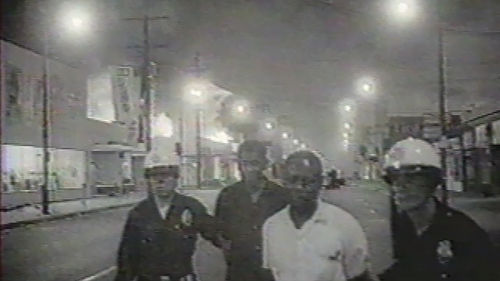
Tony Cokes: “Black Celebration (A Rebellion Against the Commodity)”
Copresentation with the Dia Art Foundation
The 17-minute film will be available for viewing on this page, beginning at 9 a.m. on Thursday, June 25 through 6 p.m. on Sunday, June 28.
Presented in consultation with the artist, Tony Cokes’s Black Celebration (A Rebellion Against the Commodity) is being screened for limited four-day run on the websites of the Hammer Museum and the Dia Art Foundation. Part of the Hammer Contemporary Collection, Cokes’s video has a renewed purpose in light of recent events and the continued struggle against state-sanctioned violence against Black people throughout this country.
Tony Cokes’s Black Celebration (A Rebellion Against the Commodity) attempts to read and understand the uprisings that took place in Black neighborhoods in Los Angeles, Boston, Newark, and Detroit in the 1960s. In Cokes’s words, “The intent of the piece is to introduce a reading that will contradict received ideas which characterize these riots as criminal or irrational.” The subtitle of the work alludes to the economic conditions that underscore the experience and construct of race in America. Cokes suggests that the “race riots” that marked the 1960s were motivated by a frustration with the racist logic of capital. The rebellions that ensued throughout the country’s cities sought to rupture the social and economic value derived from Black labor and culture. Cokes’s video utilizes samples of text from Guy Debord, Barbara Kruger, Martin Gore, and Morrissey alongside edited newsreel and documentary footage of the riots. The texts and images are set to music by the industrial rock band Skinny Puppy.





